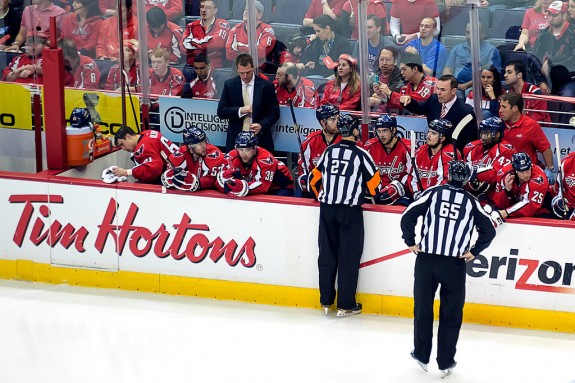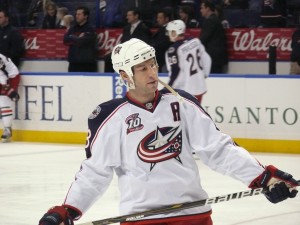The lack of respect for NHL officials is appalling; and with the playoffs in full swing, no other group has served as the perfect scapegoat. While nobody is perfect, including officials, chastising the men in stripes is laughably absurd. The challenges they face just to make it to the NHL exceed far beyond what the average person encounters and endures within their own occupation. But whether it’s pure ignorance, or the result of being severely misled, there is an overwhelming presence of “ref-bashing” throughout the media and among fans. [By the way, if you like this post – sign up for our free newsletter to get more of our best stories]

The Elite Company of NHL Officials
With 66 full time positions, the NHL’s 33 referees and 33 linesmen are part of an exclusive club. But they didn’t draw a lucky lottery ticket, or win a game of Bingo in a smoke-filled roller rink to get to that elite status. Much to the surprise of many, NHL officials weren’t just dropped in the NHL, where they just fell off the turnip truck.
“There are so many people that helped me to where I am today,” said first year official Tom Chmielewski. “My father started officiating with me so it has always been great to discuss things with him. My mother and sister have been extremely supportive throughout it all, and allowing my father and I to talk hockey all the time.”
Officials with professional aspirations find themselves at one of the various camps and or training schools that are present within Canada and the U.S. As representatives from professional and junior hockey leagues are present, they are taught the in’s and out’s of officiating the game at the professional level.
“The staff and supervisors of the USA Hockey Officiating Development Program got me off to a great start and prepared me to be a professional referee,” added Chmielewski. “Joe Ernst and the supervisors of the ECHL taught me how to be a professional and really improved my game. There are countless others who have helped me along the way and I couldn’t thank them enough.”
Obviously, not everyone who wants to join the prestigious group of NHL officials can or will. Along with a strong work ethic that results in tip-top fitness, there are certain things that just cannot be taught. Instinctual attributes, which include natural anticipation, and situation handling can be developed through the lower levels of professional hockey; but the “it” factor is ultimately something either an official has or doesn’t have.
Former NHL official Kerry Fraser described one learning experience he endured while in the minors that involved a bench-clearing brawl. Fraser, who was self-described as “inexperienced” at the time, alluded to not only handling difficult situations, but improving from constructive criticism.
“At the conclusion of the game, commissioner Bill Beagan kindly guided me in a teaching way as to what I should do when (not if) this situation was to present itself,” recalled Fraser. “Before he departed the officials’ room he left me with this final thought that has stuck throughout all these years when he said:
“‘Kerry remember this, from experience you will acquire judgment; from poor judgment you will acquire experience!'”
NHL Officials in the Playoffs
As we’ve seen throughout the early portion of the playoffs, much criticism has been hurled at the NHL officials who were assigned the privilege of working in the postseason. From television commentators, to run-of-the-mill hockey fans, finding unkind words directed at the officiating has not been in short supply.
In the second period of Game Three between the Tampa Bay Lightning and Montreal Canadiens, an apparent go-ahead goal for Tampa Bay was waived off and confirmed as a “no goal” after the officials briefly huddled. As the commentators raged on at the officials’ alleged “blunder,” fans took to Twitter to express their outrage. After the game, in which the Habs would go onto win and take an advantageous 3-0 series lead, Lightning coach John Cooper joined the frenzy.
“I was (angry) then, and I’m (angry) now,” Cooper said. “It’s tough to walk in that locker-room and look those guys in the eye when clearly that was our best game of the series. They deserved a better fate tonight.”
Whether or not the disallowed goal was the correct call gives nobody the right, or high ground to blame the outcome of the game on the officials. After all, were the officials to blame that the Lightning gave up a goal in the first 11 seconds of the game? Oh, but it’s their fault that the disallowed goal caused Tampa Bay to lose focus, and ultimately give up another two goals even after the Bolts scored again? Right.
Give credit to Cooper, however, for ultimately showing professionalism and understanding for the isolated incident.
“I know what I would have judged, but I’m one person and I’m extremely biased,” said Cooper. “But I thought it was a good goal. So it’s hard to argue. In my opinion, I saw it differently. But he’s the one making the call, he’s a human being, he sees it one way, I see it another.”
Few fans (and actual personnel for that matter) actually know the rules of the game inside and out. This pertains to the commentators who blast the officiating on a nightly basis. These are opinions; and while you don’t expect to hear how to execute a proper power play attack from an official, the same logic should apply for those who have never officiated.
Is it not possible that NHL officiating in general is just really bad? No? Okay.
— Laura (@theactivestick) April 24, 2014
Here, to me, is the REAL refereeing issue: Playoffs raise the level of every part of NHL hockey except, far too often, officiating #HabsIO
— Dave Stubbs (@Dave_Stubbs) April 23, 2014
But the playoffs matter more. Shouldn’t NHL officials be held to the highest of standards?
I can assure you they are. But before expunging on that, where did the notion that all games aren’t important come from? After all, aren’t the regular season games played to determine who qualifies for the playoffs? Furthermore, holding playoff officials to “higher standards” must mean those chosen have passed the standards set for the regular season with flying colors. Kerry Fraser explained more on that process:
“The NHL officiating department, under the direction of former referee and colleague Terry Gregson, conducts an internal evaluation and rating system throughout the regular season and Stanley Cup playoffs. Terry’s supervisory staff attend games during the season and provide computer-generated reports on each official’s performance. His staff includes former NHL officials such as Bill McCreary, Don Koharski, Mick McGeough, Rob Shick and Kevin Collins, who supervise NHL games.
“Areas of skating, positioning, penalty selection, communication and comportment, game control, team work and face-offs (linesmen) are graded. General comments would be included on the bottom of the form as to how the official performed throughout the game and if anything of consequence was observed, positive and/or negative.”
As you can see, the NHL officials that are being berated throughout the playoffs aren’t just some jokers pulled out of the poker room.
But what about obvious blown calls? I can’t tell you how many of those I’ve seen, and we’re only in the first round!
To this I’d say, cool your jets. Hockey is a game that is not nearly as black and white as other sports may be. And while officiating other sports bring their own set of challenges and obstacles, NHL officials are often subjected to using discretion and game management. With the playing surface as confined as it is, the men in stripes use their outstanding agility to avoid contact with pucks, sticks, and players. When added to deciphering the difference between a trip and a dive in a second’s time, the job isn’t nearly as easy as the guy or gal on the couch thinks.
Maybe some of you will realize now just how good the NHL officials are. They're the best in the world and it's not even close.
— doug__todd (@Doug__Todd) February 20, 2014
Missed calls are part of any sport; they happen. It’s the human effect so to speak. But before one advocates replacing them with updated technology that would no longer require the human side of the profession, ask yourself if the game would ever be the same. The answer is undoubtedly no, and not for the better. Not to mention, who would support taking actual good paying jobs away from people? People who have proven they have earned the right to be there in the first place.
NHL Officials & Favortism?

Hockey fanhood is at an all-time high during the playoffs. With the feverish cheering and rooting also comes a level of unrealistic and irrational thinking. One in particular is the belief that NHL officials have a dog in this race. It’s easy for fans to get caught up in pulling for their team to see things through the pair of their own biased goggles, as fellow THW writer, Bill Schoeninger recently pointed out. But when the roles are reversed, as former NHL official, Paul Stewart points out, the idea of securing a win for one’s hometown is beyond crazy.
“Let’s apply the same “logic” to a player’s professionalism and motivation. Columbus Blue Jackets forward R.J. Umberger is a Pittsburgh native. If he turns a puck over and the Penguins score a goal, was it because it he was secretly pulling for the Penguins to win their series against his Columbus team?
“That thought is laughable. Well, so is the idea that a referee or linesman who works his way up to the NHL has an allegiance toward — or a “bias” against — a team because of his hometown or home province. That is not how we are wired.”
I’m confident to declare that NHL officials are more focused on performing their craft with the highest accuracy to worry about who’s going to win or lose. This isn’t to suggest that they are oblivious to the score of each game since the score itself is indicative of game management and handling situations. But to accuse those in charge of keeping order of treating the game as if it were a professional wrestling event is misguided and flat out ignorant.
Back in 2010, Adam Proteau of the Hockey News responded to such a question in an open Q & A on the publication’s website. His reply to a writer named “Kevin” was contrite and to the point.
“Dear Kevin,
No, I’m afraid it’s you.
And I’m a little surprised a guy who is a referee would be insinuating that the league and its officials are in cahoots to provide unfair advantages to big-market teams; if that’s true, I suppose NHL refs must have missed the memo when Tampa Bay, Carolina and Anaheim won Stanley Cups.”
While fans pay the price of a ticket to see the players, lambasting NHL officials is utterly unnecessary. And although the officials themselves know that it’s part of the territory, who wants to ignorantly and aloofly go through anything in life? We all like to think we’re as informed as the next guy; but with the ongoing armchair officiating, that’s not a compliment. Let’s open our minds to a different perspective – one that the game cannot go on without.